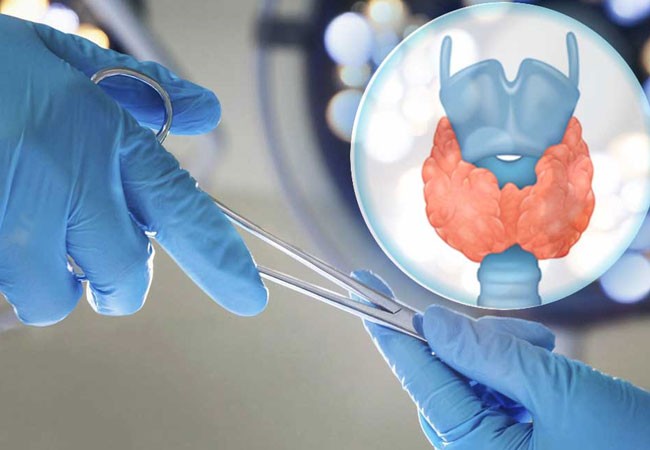What is Thyroid and Endocrine Surgery?

Symptoms Indicating Need for Thyroid and Endocrine Surgeries
Patients may experience:
- Neck swelling or visible lump
- Difficulty swallowing or breathing
- Hoarseness or voice changes
- Unexplained weight changes
- Palpitations and heat intolerance
- Muscle weakness or fatigue
- Excessive sweating or tremors
- Symptoms of hormone imbalance (e.g. calcium disturbances, cortisol abnormalities)
If such symptoms persist, medical evaluation is crucial to determine the need for surgical intervention.
Procedure or Treatment
The surgical approach depends on the gland involved and the underlying condition:
Thyroidectomy – Removal of part (lobectomy) or all (total thyroidectomy) of the thyroid gland, done for cancer, large goitre, or hyperthyroidism.
Parathyroidectomy – Removal of overactive parathyroid glands to treat hyperparathyroidism and control calcium levels.
Adrenalectomy – Removal of adrenal glands (partial or total) in cases of adrenal tumours causing hormonal excess.
Neck Dissection – Removal of lymph nodes if cancer has spread.
Minimally Invasive Surgery – Advanced techniques with smaller incisions, faster recovery, and minimal scarring.
These surgeries are done under general anaesthesia with hospital stay depending on the procedure and individual recovery.
Types of Cervical Spine Surgeries Performed
At Khobragade Multispeciality Hospital, our expert spine surgeons perform advanced surgical techniques tailored to each patient’s condition:
Anterior Cervical Discectomy and Fusion (ACDF)
– The most common procedure where the damaged disc is removed from the front of the neck, and adjacent vertebrae are fused for stability.Posterior Cervical Laminectomy
– Removes part of the vertebra (lamina) to relieve pressure on the spinal cord and nerves.Cervical Disc Replacement
– The damaged disc is replaced with an artificial disc, maintaining neck movement and reducing stress on adjacent discs.Cervical Corpectomy
– Removal of part of the vertebra and disc to decompress the spinal cord, followed by fusion.
Prevention
While genetic and some endocrine disorders cannot be completely prevented, certain measures reduce risks:
- Regular screening for those with family history of thyroid or endocrine disorders
- Monitoring thyroid nodules for early intervention
- Managing autoimmune diseases effectively
- Maintaining a healthy diet rich in iodine (unless contraindicated)
- Avoiding exposure to unnecessary neck radiation
Benefits of Thyroid and Endocrine Surgeries
- Relief from compressive symptoms (difficulty swallowing or breathing)
- Restoration of normal hormone levels
- Improved metabolism and energy levels
- Prevention of complications from hormone excess or deficiency
- Removal of cancerous tumours, reducing cancer spread
- Enhanced quality of life with minimal postoperative complications in expert hands
Types of Thyroid and Endocrine Surgeries
- Total Thyroidectomy – Complete removal of the thyroid gland.
- Hemithyroidectomy/Lobectomy – Removal of one lobe of the thyroid.
- Completion Thyroidectomy – Removal of remaining thyroid tissue after previous partial surgery.
- Endoscopic Thyroidectomy – Minimally invasive approach using small incisions and camera assistance.
- Robotic Thyroidectomy – Advanced minimally invasive surgery using robotic arms for precision.
- Parathyroidectomy – Focused or bilateral exploration to remove overactive parathyroid glands.
- Adrenalectomy – Laparoscopic or open removal of adrenal glands depending on tumour size.
- Neck Dissection Surgery – For removal of lymph nodes in thyroid cancer spread.
